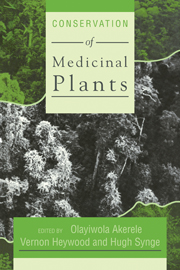Book contents
- Frontmatter
- Contents
- Contributors
- Preface
- Acknowledgements
- The Chiang Mai Declaration
- Introduction
- The Issue of Medicinal Plants
- Science, Industry and Medicinal Plants
- Techniques to Conserve Medicinal Plants
- Policies to Conserve Medicinal Plants
- 15 Policies and Organisation for Medicinal Plant Conservation in Sri Lanka
- 16 Experience in the Conservation of Medicinal Plants in Sri Lanka
- 17 The Conservation of Medicinal Plants Used in Primary Health Care in Thailand
- 18 Medicinal Plants and the Law
- 19 Let's Stop Talking to Ourselves: The Need for Public Awareness
- 20 Germplasm, Genetic Erosion and the Conservation of Indonesian Medicinal Plants
- Experiences from Programmes to Conserve Medicinal Plants
20 - Germplasm, Genetic Erosion and the Conservation of Indonesian Medicinal Plants
Published online by Cambridge University Press: 07 September 2010
- Frontmatter
- Contents
- Contributors
- Preface
- Acknowledgements
- The Chiang Mai Declaration
- Introduction
- The Issue of Medicinal Plants
- Science, Industry and Medicinal Plants
- Techniques to Conserve Medicinal Plants
- Policies to Conserve Medicinal Plants
- 15 Policies and Organisation for Medicinal Plant Conservation in Sri Lanka
- 16 Experience in the Conservation of Medicinal Plants in Sri Lanka
- 17 The Conservation of Medicinal Plants Used in Primary Health Care in Thailand
- 18 Medicinal Plants and the Law
- 19 Let's Stop Talking to Ourselves: The Need for Public Awareness
- 20 Germplasm, Genetic Erosion and the Conservation of Indonesian Medicinal Plants
- Experiences from Programmes to Conserve Medicinal Plants
Summary
Introduction
We are currently facing four great problems which are interrelated to one another, and our success to tackle them will determine the survival and the existence of Homo sapiens. The earth is presently already densely populated and this is attributed to the improvement of the standard of living which in turn resulted in the population explosion. The population explosion is the first main problem which at the same time is the root of other problems. There is no other choice but that we have to satisfy all basic needs of human beings, which comprise food, cloth, shelter, education and health. The supply of the basic needs in sufficient quantity constitutes the second problem, which, because it has reached a critical point, has to be handled through international cooperation. Large-scale exploitation of terrestrial and marine biological resources, agricultural intensification (including the use of high yielding varieties, synthetic fertilizers, pesticides, irrigation and mechanized equipment) and agricultural expansion (such as the conversion of tidal swamps and forests in arable lands) as well as the exploitation of other natural resources (such as oil and gas mining and utilization of solar energy) are examples of human activities in an effort to satisfy the basic needs. These activities give rise to the third problem, i.e. environmental degradation and the exhaustion of the biological resources. This ecological crisis leads to the fourth problem, that is how to conserve the natural resources in such a manner so as to guarantee the survival of human beings.
As a part of one of the components of the basic needs of Indonesian people, jamu (herb medicine) and other traditional medicines are directly linked with the above-mentioned serious problems.
- Type
- Chapter
- Information
- Conservation of Medicinal Plants , pp. 281 - 292Publisher: Cambridge University PressPrint publication year: 1991
- 1
- Cited by



